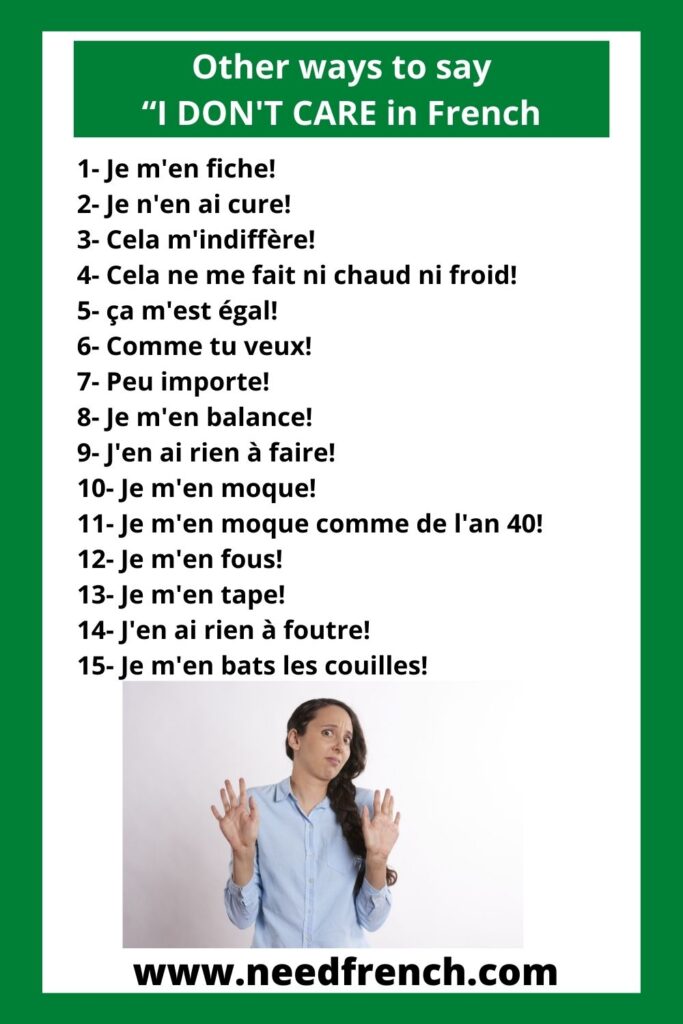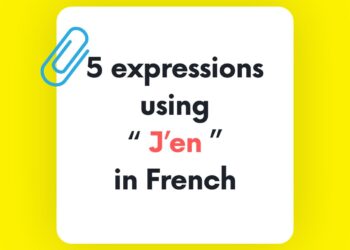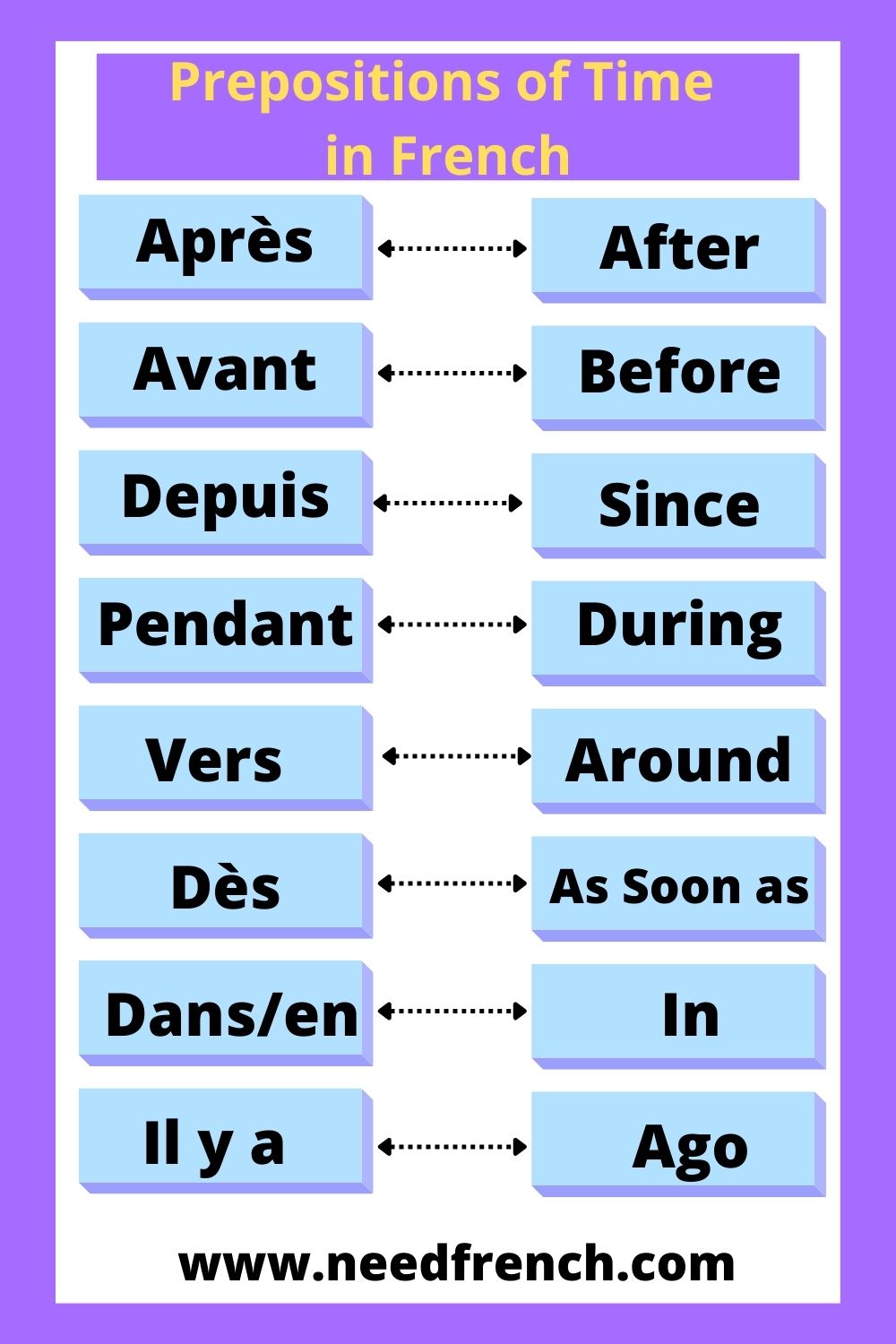Are you interested in learning French? It’s a beautiful language that can take you places, both literally and figuratively. Sometimes, however, you might need to express indifference or lack of interest. In this blog post, we’ll explore 15 different ways to say “I don’t care” in French, ranging from polite expressions to more casual and even provocative ones. These phrases will help you navigate various situations, whether you’re trying to be diplomatic or emphasize your disinterest.

Table of Contents
ToggleThe Classic: “Je m’en fiche”
Let’s start with the most common and versatile expression:
- Je m’en fiche – This is the standard way to say “I don’t care.” Formality: Neutral Literally: “I make myself bothered by it.”
14 More Ways to Express Indifference
Now, let’s explore other expressions, ranging from formal to very informal:
- Je n’en ai cure – “I don’t care about it.” Formality: Formal – Quite old-fashioned, rarely used in modern speech.
- Cela m’indiffère – “It leaves me indifferent.” Formality: Formal – A polite way to express lack of interest.
- Cela ne me fait ni chaud ni froid – “It neither warms nor chills me.” Formality: Neutral – An idiomatic way to express indifference.
- Ça m’est égal – “It’s all the same to me.” Formality: Neutral – Widely used in various contexts.
- Comme tu veux – “As you wish.” Formality: Neutral – Implies indifference to someone else’s decision.
- Peu importe – “It doesn’t matter.” Formality: Neutral – Can be used in many situations.
- Je m’en balance – “I don’t give a damn.” Formality: Informal – More emphatic than “Je m’en fiche.”
- J’en ai rien à faire – “I couldn’t care less.” Formality: Informal – Stronger expression of indifference.
- Je m’en moque – “I don’t care.” Formality: Neutral to Informal – Similar to “Je m’en fiche” but can be stronger.
- Je m’en moque comme de l’an 40 – “I care about it as much as I care about the year 40.” Formality: Informal – Colorful expression emphasizing complete indifference.
- Je m’en fous – “I don’t give a damn.” Formality: Very Informal – Considered vulgar, use with caution.
- Je m’en tape – “I couldn’t care less.” Formality: Very Informal – Strong expression of indifference.
- J’en ai rien à foutre – “I don’t give a f***.” Formality: Very Informal – Vulgar, use with extreme caution.
- Je m’en bats les couilles – “I don’t give a f***.” (extremely vulgar) Formality: Very Informal – Extremely vulgar, avoid in most situations.
How to Use These Expressions
- In formal or professional settings, stick to polite expressions like “Cela m’indiffère” or “Peu importe.”
- For everyday situations, “Je m’en fiche” or “Ça m’est égal” are safe choices.
- With close friends, you might use more informal expressions like “Je m’en balance.”
- Be very cautious with the vulgar expressions (12-15). They can be highly offensive in many contexts.
Practice Activity
Consider how you might express indifference in these scenarios:
- Your colleague asks which restaurant to choose for a team lunch, but you have no preference.
- A friend is trying to decide between two movies to watch, and you’re fine with either.
- Someone is gossiping about a celebrity, and you want to show you’re not interested.
Which expression would you use in each situation? How would you adjust your tone?
Cultural Note
In French culture, expressing indifference can sometimes be seen as impolite, especially in formal situations. It’s often better to show mild interest or defer to others’ preferences rather than stating outright that you don’t care. The stronger expressions on this list are generally used among close friends or in situations of frustration.
Regional Variations
- In Quebec, you might hear “Ça me dérange pas” (It doesn’t bother me) as a way to express indifference.
- In Belgium, “Je m’en fous royalement” (I royally don’t care) is a colorful way to express strong indifference.
Conclusion
While knowing these expressions can be useful, it’s important to use them wisely. In most situations, a polite expression of neutrality or deferring to others’ preferences is more appropriate than a strong statement of indifference. Remember, the tone and context in which you use these phrases are just as important as the words themselves.
How do you typically express indifference in your language? How does it compare to these French expressions? Share your thoughts in the comments below!
Want to expand your French vocabulary further? Check out our other articles:
- 11 Ways to say “I’M HUNGRY” in French
- 11 Ways to say “I’M FULL” in French
- 11 Ways to say “I DIDN’T HEAR” in French
Bonne chance avec votre apprentissage du français, et ne vous en faites pas trop ! (Good luck with your French learning, and don’t worry too much about it!)














